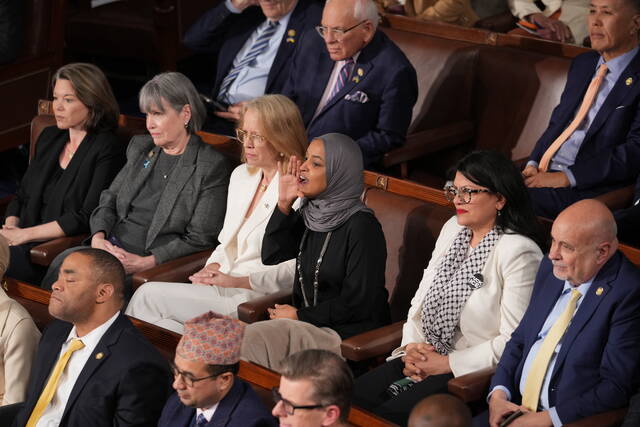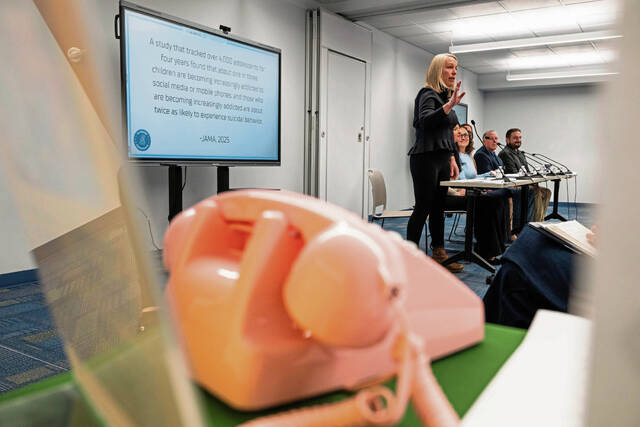A Butler County Common Pleas judge is not entitled to immunity for the majority of claims filed against him in a sexual discrimination lawsuit nearly three years ago.
The 3rd U.S. Circuit Court of Appeals issued the opinion on Monday, affirming the decision of the lower court on three of four claims filed against Butler County President Judge Thomas Doerr.
The opinion, written by Circuit Court Judge Thomas M. Hardiman, now sends the case back to district court to proceed.
A female probation officer filed the lawsuit in October 2017, naming Doerr as a defendant, as well as deputy court administrator Thomas Holman and Butler County Court of Common Pleas, alleging a hostile work environment; a violation of her First Amendment rights; as well as claims of due process and equal protection violations.
The Tribune-Review generally does not name people alleged to be victims of sexual harassment.
According to the opinion, the woman met Doerr in 2004 at a Christmas party, and they exchanged phone numbers.
By early 2005, after declining multiple requests to meet Doerr in his chambers, the probation officer visited him there. In her complaint, she said that she did not want to have sex with him, but she did.
“Earlier that evening, Doerr had discussed the prospect of hiring [her] as a probation officer in Butler County. Doerr later told [her] that ‘their sexual interactions would be a ‘business relationship.’”
In the summer of 2005, the opinion said, a position opened up in Butler County probation, and Doerr, who had authority over the process, ensured the woman was hired.
Their sexual relationship continued for four years, the filing said.
After it ended, the woman alleged Doerr still tried to influence her. Then in 2014, she asked to be transferred to the domestic relations office, but decided within the 30-day window that she wanted to return to probation.
At first, the opinion said, Doerr denied her move, but after agreeing to sign a general release waiving claims against the court, she was permitted to return.
However, according to her complaint, the woman was denied her own office, overtime, training opportunities and the right to serve on-call.
“She also was isolated from other officers and was not allowed to supervise other probation officers in the field. And whenever she visited probationers, Doerr assigned two male partners to accompany her because he believed it was too dangerous,” the opinion said.
After getting a right-to-sue letter from the Equal Employment Opportunity Commission, the woman filed her federal lawsuit in October 2017.
Doerr moved to have the complaint dismissed, citing qualified immunity — a doctrine that protects government officials, named as individuals, from lawsuits in which they are accused of violating a person’s constitutional rights.
His motion was denied in October 2018.
In a 25-page opinion, Hardiman wrote that Doerr was not entitled to qualified immunity on the sex discrimination claim; the hostile work environment claim; or for the woman’s freedom of expression claim.
““In considering whether qualified immunity attaches, courts perform a two-pronged analysis to determine: (1) ‘whether the facts that [the] plaintiff has alleged…make out a violation of a constitutional right,’and (2) ‘whether the right at issue was ‘clearly established’ at the time of [the] defendant’s alleged misconduct.’”
The 3rd Circuit did find that Doerr was entitled to qualified immunity on the plaintiff’s First Amendment association claim.
In that claim, she alleges that after she ended the relationship with him, Doerr tried to coerce her into maintaining it — including by insisting she appear in his courtroom and transferring her to the juvenile division. She also claimed that after she started dating the man she later married, who was also a probation officer, Doerr and the court administration harassed him, ultimately causing him to retire.
In granting Doerr qualified immunity on that claim, Hardiman wrote that there is no fundamental right to “intimate association” for unmarried, romantic partners, and therefore Doerr is entitled to qualified immunity on the claim that he interfered with her relationship with her husband.
The appellate court remanded the case back to district court to continue.








